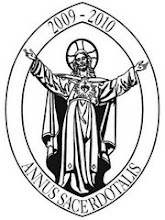
The Vatican has announced an Apostolic Constitution in which:
the Holy Father has introduced a canonical structure
that provides for such corporate reunion by establishing Personal Ordinariates, which will
allow former Anglicans to enter full communion with the Catholic Church while preserving
elements of the distinctive Anglican spiritual and liturgical patrimony. Under the terms of
the Apostolic Constitution, pastoral oversight and guidance will be provided for groups of
former Anglicans through a Personal Ordinariate, whose Ordinary will usually be
appointed from among former Anglican clergy.
A joint statement by the Archbishop of Westminster and the Archbishop of Canterbury was also released this morning, from which I quote:
The Apostolic Constitution is further recognition of the substantial overlap in faith, doctrine and spirituality between the Catholic Church and the Anglican tradition. Without the dialogues of the past forty years, this recognition would not have been possible, nor would hopes for full visible unity have been nurtured. In this sense, this Apostolic Constitution is one consequence of ecumenical dialogue between the Catholic Church and the Anglican Communion.
Archbishop Rowan Williams has put his signature to the above paragraph, i.e. he agrees that the prospect of full communion with Rome is a legitimate outcome of ecumenical dialogue.
If forty years of ecumenical dialogue has brought some groups of Anglicans to a point where they wish to ask to be admitted to full communion with the Catholic Church,is that sign of conversion, or convergence?
Two years ago, this month, two representatives of theTraditional Anglican Communion, were appointed to make the formal request to the Holy Father, to be admitted to full communion with the Catholic Church. That is, they made the request shortly after the promulgation of Summorum Pontificum.( The Anglicans, with whom today's announcement might resonate, are not just concerned about the attempted ordination of women to priesthood).
Just before doing so, I have read, (but can't find the link), they visited a shrine of Our Lady in England and deposited in that shrine a kind of 'credo'; a statement of their beliefs.
I don't know if that shrine was Walsingham, but it seems possible given that Walsingham is Our Lady's foremost English shrine for both Catholics and Anglicans.
Wasn't it in Walsingham, that Our Lady made it known, that when English pilgrims came to Walsingham, the Faith would return to England?
We do live in exciting times!
God bless the Holy Father and God bless all those who may now seek to cross the Tiber, and enter into full communion with the One True Church.




No comments:
Post a Comment